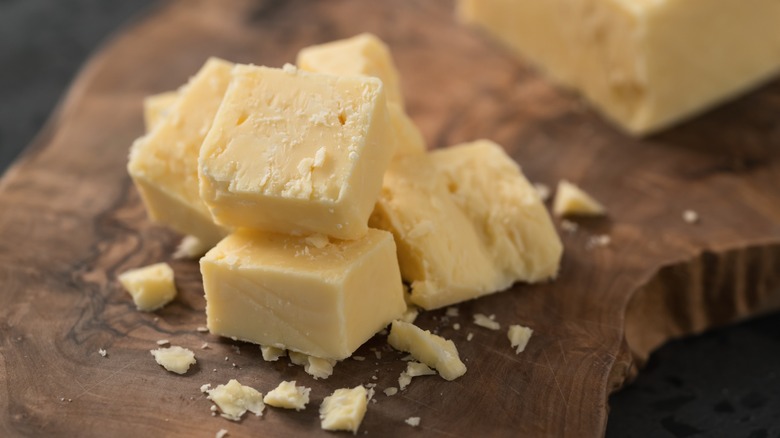This Is The World's First Carbon Neutral Cheese
Those involved in raising livestock for consumption are only too aware of the impact animals have on the environment. Cows are huge natural emitters of methane, thanks to the amount of manure each animal generates and the fact that they burp, shares Dairy Global. Because of that, and because of they need plenty of water and land to grow, cows (and by extension beef and cheese) have been called out as two food items whose production has a detrimental effect on the environment (via Insider).
Independent British cheese producer Wyke Farms has decided to do something about that, and as a result, it has unveiled what it calls the world's first carbon neutral cheese. According to FoodBeast, Ivy Reserve Vintage Cheddar is aged for 18 months and is described as "complex, slightly sweet, and nutty."
"This has been a 12-year journey for us. We started our '100% Green' strategy in 2010 when we made a commitment to energy independence and generating all of our gas and electric from renewables. Since then, we have invested in our knowledge base across this business and on farm driving environmental improvement year on year," shared Wyke Farm's Managing Director, Rich Clothier.
To create a carbon neutral cheese, the farm said it had "worked closely" with Carbon Trust, which sets specifications for carbon neutrality.
Food production has a large carbon footprint
The new carbon neutral cheese could not come at a better time.
In 2011, a research group called CleanMetrics released a report linking food production with climate change. Business Insider broke the report down, revealing which of the foods we consumed regularly had the largest carbon footprints. On the top of that list was lamb, which had a carbon footprint of 39.2 kilograms; followed by beef (27 kilograms); then cheese (13.5 kilograms); followed by pork (12.1 kilograms); farmed salmon (11.9 kilograms); and turkey (10.9 kilograms). The reasons for these values varied, from the distance the ingredients needed to travel to get from farm to table to the processing needed to get the meat ready.
While one could argue that the report is more than a decade old, the fact is, not much as changed since that time. In 2021, the United Nations noted that "The world's food systems are responsible for more than one-third of global anthropogenic emissions" (via Twitter) — with food production-related emissions pegged at about 18 billion tons in 2015. In the report, the UN also pointed out that our food systems were "becoming more energy intensive, reflecting trends in retail, packaging, transport, and processing, whose emissions are growing rapidly in some developing countries."
Though Wyke Farms may be the first to advertise a carbon neutral cheese, it will hopefully not be the last.

